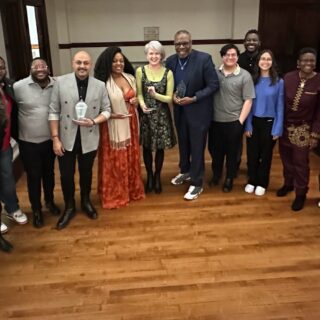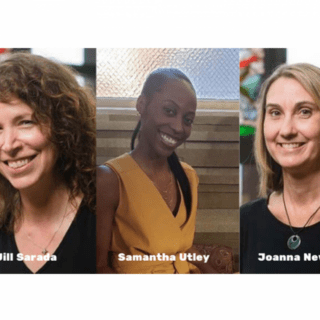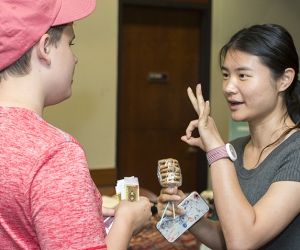
Pitt School of Education Welcomes Ten New Faculty
The University of Pittsburgh School of Education has bolstered its faculty ranks by hiring six assistant professors and four visiting professors for the 2021-22 academic year.
The new faculty members—who have expertise across higher education policy, digital media and learning, and language, literacy, and culture—will teach, conduct research, and build community-engaged partnerships.
“I am extremely excited to welcome our new colleagues to our School of Education at the University of Pittsburgh,” says Valerie Kinloch, the Renée and Richard Goldman Dean of the Pitt School of Education. “Our new faculty, all of whom were hired following national searches, are outstanding scholars and widely respected thought leaders in their fields. They are already making substantial contributions to scholarship and practice related to reimagining teaching, learning, and engagement as well as to understanding the role of policy in higher education.”
“I am looking forward to seeing how they will individually and collectively add to current efforts underway in our school, especially when it comes to strengthening our commitment to equity, justice, innovation, and providing a high-quality education to students,” says Kinloch.
Visiting Professors
The new visiting professors are Visiting Associate Professor George Barganier (Associate Professor in criminal justice studies at San Francisco State University), Visiting Assistant Professor Camilla Bell (graduate of the Syracuse University PhD program in cultural foundations of education), Colleen Eddy (graduate of the University of Missouri PhD program in counseling psychology), and Visiting Assistant Professor Tom Ralston (former superintendent of Avonworth School District). Ralston is also the new director of the school’s Forum for Western Pennsylvania School Superintendents.
Assistant Professors
In addition, Pitt Education has hired the following six assistant professors:
[Click the links below to learn more about them.]- M. Beatrice Dias – Assistant Professor of Digital Media, Learning, and Leadership (Department of Teaching, Learning, and Leading)
- Heather McCambly – Assistant Professor of Critical Higher Education Policy (Department of Educational Foundations, Organizations, and Policy)
- Lisa Ortiz – Assistant Professor of Language, Literacy, and Culture (Department of Teaching, Learning, and Leading)
- Watufani Poe – Assistant Professor of Language, Literacy, and Culture (Department of Teaching, Learning, and Leading)
- Veena Vasudevan – Assistant Professor of Digital Media and Learning (Department of Teaching, Learning, and Leading)
- Hayley Weddle – Assistant Professor of Educational Policy (Department of Educational Foundations, Organizations, and Policy)
M. Beatrice Dias – Technology and Justice
M. Beatrice Dias believes that, guided by the wisdom of community, technology can be a tool for social justice.
For the past eight years, she worked at the Community Robotics Education and Technology Empowerment (CREATE) Lab at Carnegie Mellon University. The lab aims to be in partnership with educators and City of Pittsburgh residents to develop useful innovations to improve their lives.
One notable CREATE Lab invention was the Smell Pittsburgh mobile phone application, and the Smell MyCity app for other cities. The apps crowdsource pollution odor reports and give residents a mechanism for advocating for environmental justice in the region.
“It wasn’t just a cool gadget, but it was actually a tool that would enhance the lives of someone in the community,” says Dias, who holds a PhD in Engineering and Public Policy from Carnegie Mellon.
Now, Dias is joining the faculty of Pitt Education as an assistant professor of digital media, learning, and leadership. She will be part of a team that aims to develop academic courses and conduct innovative research about how to meaningfully incorporate digital media and technology in education to honor the School’s mission-vision for social justice and equity.
“I want to understand how technology and innovation spaces can be empowered through the wisdom of educators and students whose voices have been largely absent from technology development thus far,” says Dias.
Heather McCambly – Centering Equity in Philanthropy
Heather McCambly sees a big disconnect in the philanthropy world.
For decades, large foundations have pledged to support equality in education. But in reality, racial inequities persist even as the educational practices promoted by the foundations change.
McCambly, a new assistant professor of critical higher education policy at Pitt Education, wants funders to have greater accountability and answerability to communities.
“I try to understand the conditions under which grantmakers actually invest in policies and programs in higher education that disrupt racial inequality rather than reproduce it,” says McCambly.
The goal of her work, she says, is not only to critique but to also “spot the potential for hope, the places and moments where grantmakers are considering new and more equitable ways forward that could permanently shift power.”
McCambly earned her PhD in Human Development and Social Policy from Northwestern University in 2021. Her dissertation is titled “Change Agents or Same Agents? Grantmakers and Racial Inequity in U.S. Higher Education.”
Before that, McCambly held several positions where she witnessed the effects of grant-making firsthand. She worked as a research assistant in Northwestern’s Institute for Policy Research, a project director at the University of Illinois Urbana-Champaign’s Office of Community College Research and Leadership, and a program associate at the Association of American Colleges and Universities.
Lisa Ortiz – Understanding the Latinx Migrant Experience
Latinx immigrants are part of many rural communities in the United States. Lisa Ortiz studies the migrant experience through the lens of Puerto Ricans specifically.
“Focusing on Puerto Ricans allows me to learn about how folks are using knowledges to negotiate similar and different ethno-racial realities related to citizenship, gender, and class in destinations that are not always imagined as having Latinx communities in them,” says Ortiz.
Ortiz is a new assistant professor of language, literacy, and culture at Pitt Education. She is part of the University of Pittsburgh’s Latinx Hiring Cluster initiative.
Most recently, Ortiz was a Provost Postdoctoral Research Scholar in the University of Iowa Department of Gender, Women’s and Sexuality Studies and Latina/o/x Studies program. She previously served as the Andrew W. Mellon Postdoctoral Research Scholar for the “Imagining Latinidades: Articulations of National Belonging” Sawyer Seminar and as an instructional assistant professor at the Illinois State University Women’s and Gender Studies Program.
In 2018, Ortiz earned her PhD in Educational Policy Studies from the University of Illinois at Urbana-Champaign.
Watufani Poe – Learning from Oppressed Voices
Watufani Poe believes the social movements of oppressed communities have much to teach us.
“I want to know what we can learn from Black folks, particularly those written out of the archives and narratives of society, in terms of knowledge production,” says Poe.
Poe will join Pitt Education as an assistant professor of language, literacy, and culture in fall 2022. His start date is later so he can complete a one-year post-doctoral fellowship at Amherst College in the Department of Black Studies.
In 2021, Poe completed his PhD in Africana Studies from Brown University. His dissertation was titled “Resisting Fragmentation: The Radical Possibilities of Black LGBTQ+ Activism in Brazil and the United States.”
Poe is a scholar of the Black queer diaspora, Black Latin America, and questions of inequality and social movement. He previously completed a Fulbright Scholarship program in Brazil. He is a fluent speaker in English and Portuguese, and is proficient in Spanish.
Veena Vasudevan – Student-Centered STEM Experiences
Veena Vasudevan has seen the good that comes from placing young people at the center of their educational journey.
Curiosities are sparked. Learning is ignited.
Vasudevan, a new assistant professor of digital media and learning at Pitt Education, has completed two postdoctoral experiences that engaged children in Science, Technology, Engineering, and Mathematics (STEM).
Most recently, through the New York University Steinhardt School of Culture, Education, and Human Development, she worked on the MindHIVE citizen science initiative. The National Science Foundation-funded project provides a web-based platform for high school students to design and implement original brain and behavior research.
“It gives students a window into what real science is and what scientists do,” says Vasudevan.
At NYU, she also worked on a second NSF-funded project, Building Data Literacy through the Arts, where she worked closely with teachers to cultivate curricula that used arts to nurture students’ interest in and knowledge of data literacies.
Before that, Vasudevan worked the American Museum of Natural History in New York City. The project, titled “Supporting Teachers’ Use of Active STEM Learning with PreK Students and their Families at School, Museum, and Home,” allowed her to work with early childhood school educators to facilitate science learning in their classrooms.
“What was profound to me was how rewarding it was for educators to be positioned as learners, and to play and create and be in the same environment as their students,” says Vasudevan.
In 2017, Vasudevan earned her PhD in Teaching, Learning, and Teacher Education from the University of Pennsylvania Graduate School of Education.
Hayley Weddle – Shaping Practice and Policy
Hayley Weddle not only studies education policy. She also creates it.
Weddle, a new assistant professor of education policy at Pitt Education, served on the state of California’s Recovery with Equity Taskforce. The group was formed at the direction of the governor’s senior higher education advisor to develop plans to guide the state higher education system’s response to the COVID-19 pandemic.
Before that, Weddle served on the University of California Board of Regents as the sole voting student representative. The role represents more than 280,000 students across 10 UC campuses.
In 2020, Weddle earned her PhD in Education from UC San Diego. Afterward, she worked as a postdoctoral fellow with the school. She worked on research-practice partnerships with school and state leaders that examined issues of equity and access for multilingual learners. Of particular interest was the impact of policies and procedures on students’ experiences.
“In my research, I study how policies unfold across state and local levels and the equity implications for students,” says Weddle.




